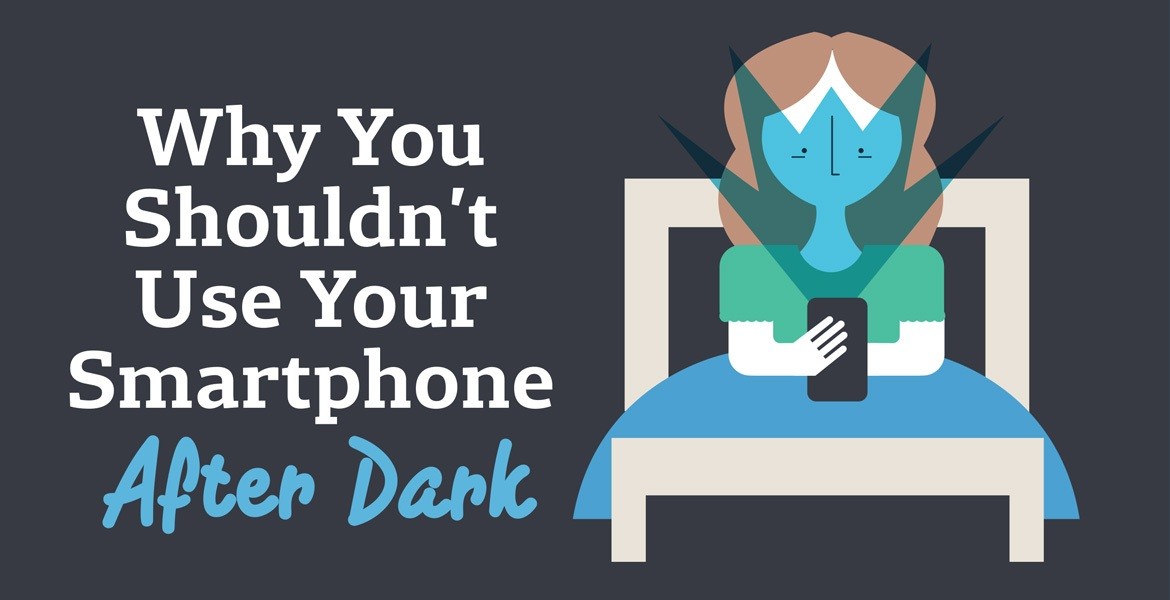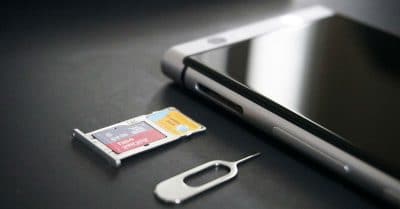The Dangers of Blue Light at Night
Like the majority of smartphone users, chances are you constantly check your device just to find something to do. Research suggests that most of us even take it to the toilet to keep occupied while we do our thing. More importantly, though, 78% of us are now taking our phone to bed at night and spending a good chunk of time on our devices prior to going to sleep. [1]
There is an underlying issue with this, at night artificial light can throw our body’s clock out of sync, but not all colours of light have the same effect on us. [2] In particular, blue wavelengths, which are perceived as bright white light, are the most disruptive to our bodies at night. Receiving blue light from the sun during the day helps us to remain alert and focused, allowing us to perform optimally and keep our spirits high. The problem is that the screens of all our favourite electronic devices emit large amounts of blue wavelength light increasing our exposure after the sun has set.
Darkness is nature's cue to the body that it’s time to wind down for sleep, informing the brain to start secreting the hormone melatonin. [3] The problem specifically with blue wavelengths of light at night is that they’re the most disruptive at suppressing the production of melatonin, which makes it harder to fall asleep and achieve good quality sleep once you doze off.
Because our bodies aren’t receiving the proper signals that it is time to start feeling tired and go to sleep, there can be severe short and long-term repercussions to our health, not only from poor quality sleep but also from a melatonin deficiency in the body. [4]
Studies have linked melatonin suppression at night with a vast array of health issues including metabolic syndrome, obesity, depression and even cancer. [5] Also, changes to our sleep patterns can disrupt our body’s circadian rhythm which is our natural body clock.[6] Disruption of the circadian rhythm can be extremely detrimental to the body as it not only controls our state of being awake but also various internal body clocks that dictate the function of our organs.
More and more scientists are now starting to realise that exposure to bright light on an evening could be more harmful than originally thought. In fact, The King's College London and Cardiff University recently reviewed available evidence on connections between child sleep patterns and device use. The academics looked at 20 studies involving more than 125,000 children who had an average age of 14. The researchers found that children and teenagers who use mobile phones and tablets at bedtime are more than twice as likely to be getting too little sleep as those who don't. [7]
To help raise awareness on the dangers that late-night smartphone use can have on our body, we produced the following infographic:
Embed The Dangers of Blue Light on Your Site: Copy and Paste the Code Below:
The Danger of Blue Light at Night
Staring at a bright screen after dark prevents your body from getting the sleep it needs, which can lead to a wide range of health implications. The problem is caused by screens emitting huge amounts of blue light; all done to enable us to recognise a greater depth of colour for a more immersive experience. But it comes at a price…
Exposure to blue light suppresses melatonin production. Blue wavelength light stimulated Ganglion cells in the retina which tricks the body into thinking it's daytime by sending a nervous signal to the Hypothalamus in the brain.
Within the Hypothalamus the signal is picked up by the Suprachiasmatic nuclei (SCN). The SCN produced signals that manage our daily sleep and wake cycles. These signals cause the Pineal gland to stop secreting the hormone Melatonin.
Melatonin is Our Natural Sleep Initiator
Suppressing the production of melatonin makes it harder to fall asleep and achieve a good quality of sleep once you doze off.
Research suggests that blue light exposure after dark directly contributes to a host of mind and body health issues including but not limited to:
- Depression
- Memory
- Concentration
- Libido
Blue light is believed to contribute to:
- Cataracts
- Diabetes
- Fertility
- Heart Disease
- Obesity
In a nutshell – poor quality sleep leads to sleep deprivation which impacts and the brain & body, which can lead to health complication thus shortening your life expectancy.
Things You Can Do
- Limit the use of phones, tablets and laptops 2 hours before going to bed [8]
- Install and enable blue light control apps – iPhone: Enable Night Shift, Android: Install Twilight [9], [10]
- Hold the device at least 12 inches from your eyes
Sources
[1] http://www.herts.ac.uk/about-us/news/2014/april/online-survey-reveals-new-epidemic-of-sleeplessness
[2] https://www.nytimes.com/2011/07/05/health/05light.html
[3] https://www.pnas.org/content/pnas/112/4/1232.full.pdf
[4] http://cescos.fau.edu/observatory/lightpol-astro.html#Brainard_Action_Spectrum
[5] http://cescos.fau.edu/observatory/lightpol-melatonin.html
[6] https://www.nhs.uk/live-well/sleep-and-tiredness/why-lack-of-sleep-is-bad-for-your-health/
[7] https://jamanetwork.com/journals/jamapediatrics/article-abstract/2571467
[9] https://www.ncbi.nlm.nih.gov/pubmed/20030543
[10] https://www.bbc.co.uk/news/health-34744859
[11] http://www.bluelightexposed.com/#where-is-blue-light-found





